Blogs
PIMLICO STATE HIGH SCHOOL – NATIONAL SURVEY RESULTS AND REFLECTION ON RESULTS
We surveyed 261 Australians aged between 10 and 21. They came from across the country and from various states. This was important as Australia is the planet's sixth largest country at 7 692 024 km2. It accounts for five percent of the world's land area, it is the smallest continental land mass and it is the world's largest island. As a result our continent has a range of climate zones, experiences various climate events and is facing a range of global warming issues.
A number of students have collaborated to reflect on the survey results.
Q1: Changes in the climate are impacting me personally. By Jeong Oh Park and Valentine Bester
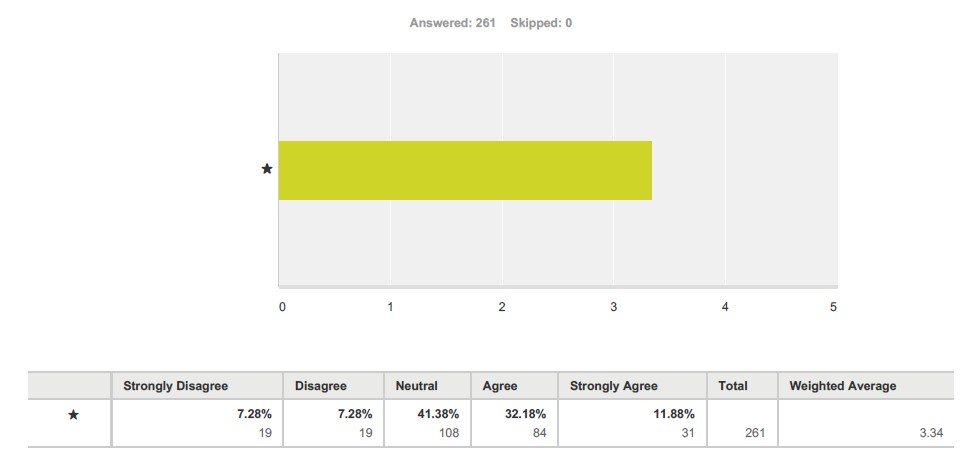
Impacts of climate change on people are varied depending on where a person might live. In Australia, people are not very affected or may not notice it due to the higher quality of life. The development level of Australia is quite high (2nd in the world according to the UN Development Programme), so Australian people can do things to limit the effects of climate change. Damage to property will be rising, though, as climate change will make natural disasters like cyclones and bushfires more common. Meanwhile, in some islands in the Pacific, climate change has a more severe effect. As global sea levels rise, some islands are disappearing under the ocean, like Tuvalu and Kiribati. Already, five islands have disappeared beneath the Pacific Ocean.
The results collected do seem to reflect this, with the weighted average being 3.34, or neutral to agree. Nearly 45% of the people agreed with the statement, while only about 15% of people disagreed.
Q2: Changes in the climate are impacting on Australia. By Jeong Oh Park and Valentine Bester
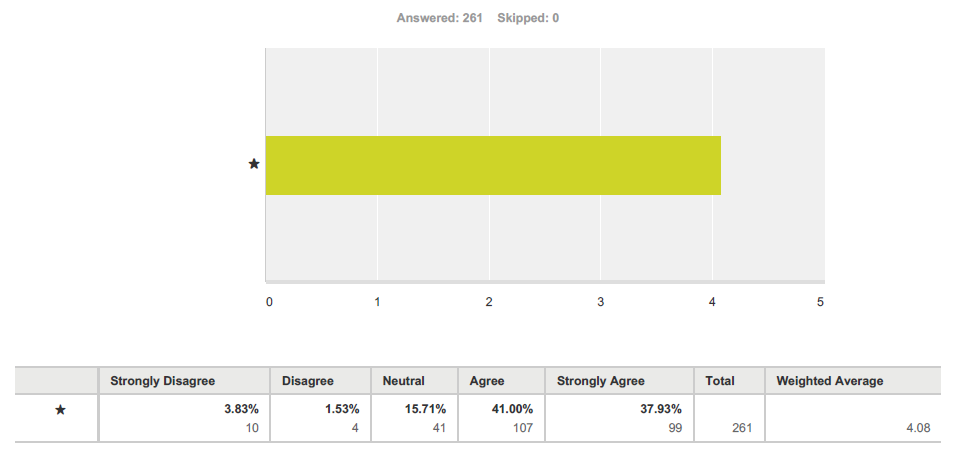
The nature of this question is quite interesting. Australia is definitely being impacted by climate change. That can be seen anywhere. In the Townsville area, water restrictions impact everyone on a personal basis. Limits on watering you garden however may not seem like much of an impact. People are very caught up in the commercialism and consumerism of modern life which is distracting. Funnily enough however, the final results did not show this and in fact, quite contrasted this as the majority of people did in fact believe that climate change is impacting Australia, roughly 4 out of 5 in fact. Of course the effects of climate change are visible. In roughly the last 60 years, the average temperature across Australia has increased by 0.9o celcius which is quite a scary fact, but few people would even care as long as they have air conditioning. While the current data might not seem like much of an issue, the situation is exponential, that is to say, the worse it gets the easier it is to get worse. People must change in order to counter the environmental disaster we face and for them to change, their opinions must be changed and in addition to noticing the issue they must do something about it.
Q3: My individual actions have a significant effect on the Global Climate. By Jeong Oh Park and Valentine Bester
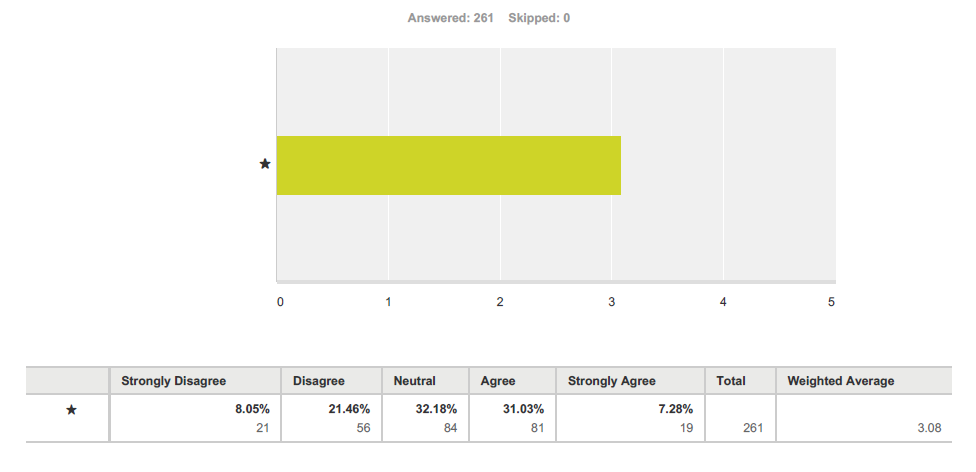
The results of this particular question will be quite defining for the personal outlook of young Australians. Whilst we might believe that we have a minor impact on climate change our impact is actually quite horrific as we come in at 12th place for carbon footprint per capita of all the world’s countries. While we may be small each individual person consumes more than necessary to the point that it is somewhat ridiculous. People like to think that because they recycle or because they don’t water their garden in excess that they aren’t effecting the environment too much but in the scheme of things, running your air conditioners, using excessive packaging and moving around on unsustainable transportation amongst other things really add up in having a negative impact. This was in fact reflected in the results, as it could clearly be seen that people were on the fence and seriously considering their impact on the environment. It is good to see that people gave thought to the question because living in a first world country we have a very high impact which must be changed.
Q4: My community cares about taking action on climate change? By Jeong Oh Park and Valentine Bester
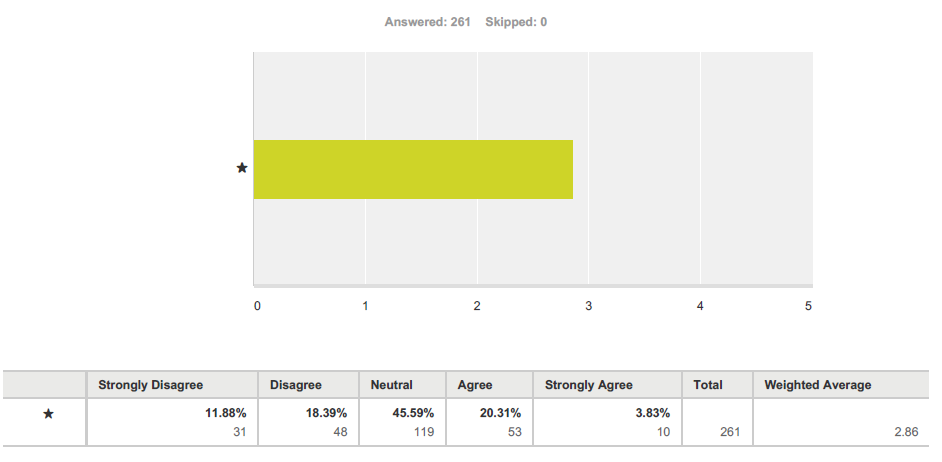
Taking action on climate change is being overshadowed by other concerns in the Australian Community. The government is currently focussed on other issues like the economy, terrorism, and maintaining border protection. Australia is quite unconcerned by climate change. Some years ago, the answer would have been different. The government was pushing for more solar panels on roofs and more solar farms in the uninhabited parts of Australia. The reason Australia’s uncaring is important is because Australia is the 12th highest carbon releasing country per capita in the world. If Australia does not do something, then the rest of the Pacific and possibly the world will be suffering because of our lack of direct action. It can already be seen that other countries are making progress on climate change while we seem to have ‘lost’ interest.
In terms of the results, people generally seemed to be neutral on whether their community cares about climate change, with the weighted average being 2.86, slightly lower that neutral. It was expected that this would be lower, since Australia is not so focussed on climate change.
Q5 I get most of my energy (electricity, transportation, etc.) from fossil fuel sources such as coal, oil and gas. By Breanna Shaw and Flony Anjilivelil
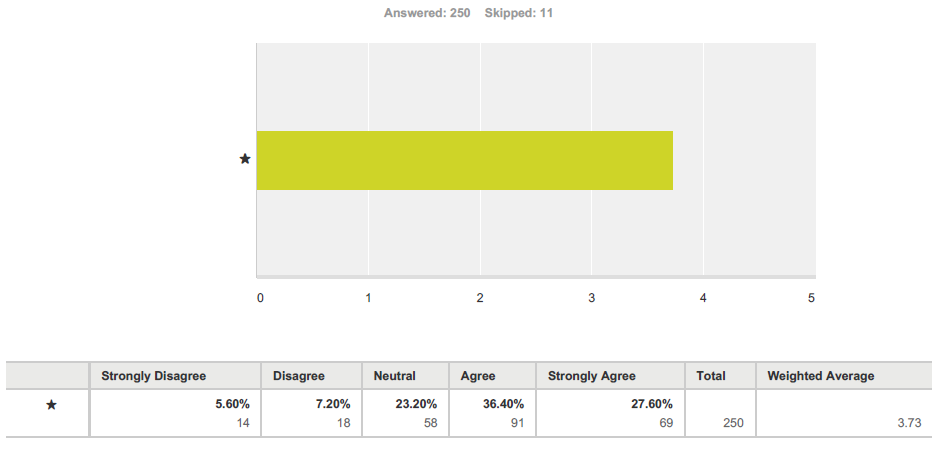
Australia’s Energy Consumption
Renewable electricity generation such as hydro, wind and solar make up only 11% of the total Electricity Generation, meaning that 89% of electricity is not from a renewable source.
The survey showed that only 68% agreed that Australians get most of their energy from fossil fuels. With the knowledge that most of Australia's energy comes from coal, it is clear that the focus on renewable energies over the last 10 years has created an inaccurate impression of where their energy comes from and thus the effect on our climate.
Q6. I know where most of my food is grown/raised. By Breanna Shaw and Flony Anjilivelil
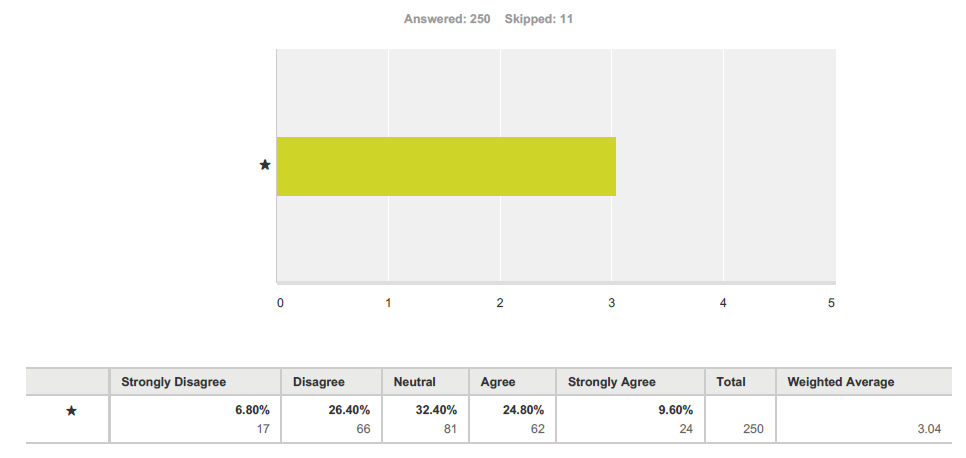
The overwhelming majority of food sold in Australia is grown and supplied by Australian farmers. We are able to export more than half of our agricultural produce, while more than 90 per cent of fresh fruit and vegetables, meat, milk and eggs sold in supermarkets are domestically produced. Of the foods imported into Australia, a substantial proportion is comprised of highly processed foods, speciality branded spirits, seafood and processed fruit and vegetables.
Climate change could severely affect the agricultural land in Australia, forcing companies to import food from overseas where the climates are suitable for farming. For example, a number of fruits, particularly citrus fruits are bound to suffer a production loss when temperatures of over 37 degrees are experienced. A study conducted by Webb in 2006 proved that an increase in temperature due to climate change negatively affected the quality of grapes across Australia. In summary, a change in climate has the potential to adversely affect the quality of produce across Australia, decreasing sales and encouraging the importation of goods to Australia, negatively impacting the economy.
34.4% of those surveyed knew where their food is grown, while 33.2% did not.
7. My Community disposes of waste responsibly By Saige Quadrio, Tharushi Seenikkue and Jade Stanek
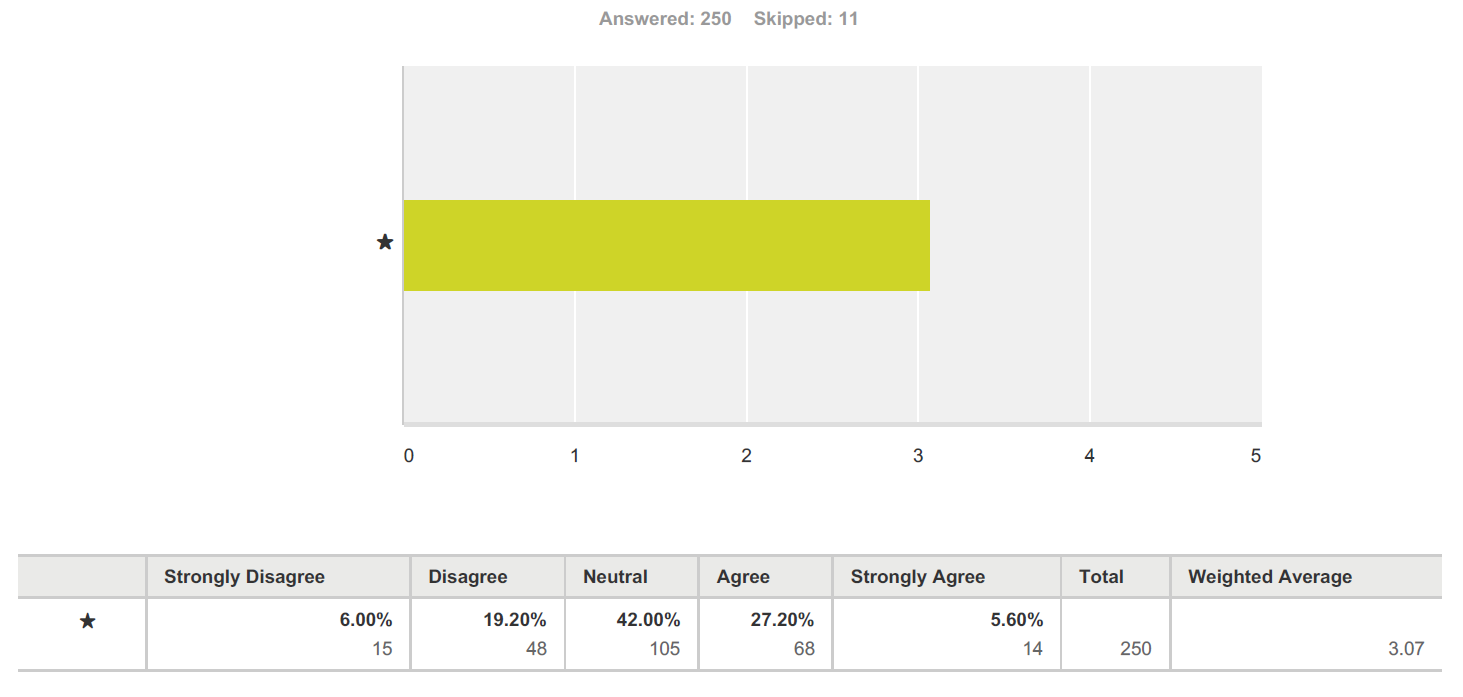
The Australian community does dispose waste responsibly. In November 2009 Australia employed the National Waste Policy which regulated and directed the responsible disposal of waste. The National Waste Policy targets:
- -Avoiding the generation of waste and reducing the amount of waste for disposal
- -Manage waste as a resource gas
- -Ensuring waste treatment, disposal, recovery and re-use is undertaken in a safe, scientific and environmentally sound manner
- -Contributing to the reduction in greenhouse gas emissions, energy conservation and production, water efficiency and the productivity of the land.
However it should be considered that most of the waste is put in a landfill and there is no efficient method of sorting and utilising the waste
For the statement in question 8 that “My community disposes of waste responsibly” the majority of people voted ‘Neutral’ (42%) with a slight lean towards ‘agree’ in the data.
8. In my country, climate change is an important political issue. By Saige Quadrio, Tharushi Seenikkue and Jade Stanek
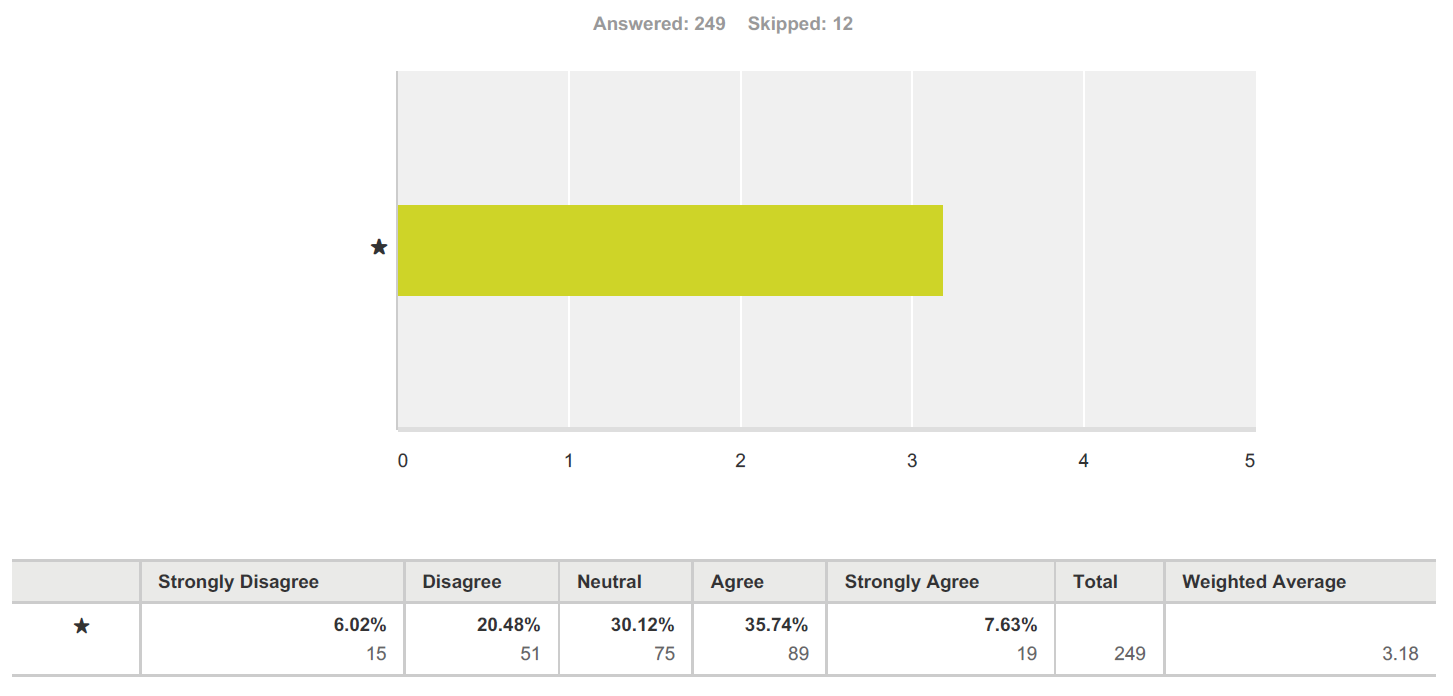
There has been a fundamental change in climate change as a political issue in Australia. The Australian Government is more focussed on the economy and the creation of jobs than addressing the issues associated with climate change. While it is still an issue on the political agenda there has been a significant reduction in programs and funding that focus on addressing climate change. The result has been that the Australian public overall is less engaged with environmental issues.
Question 9: Climate Change is affecting my Country’s Economy By Saige Quadrio, Tharushi Seenikkue and Jade Stanek
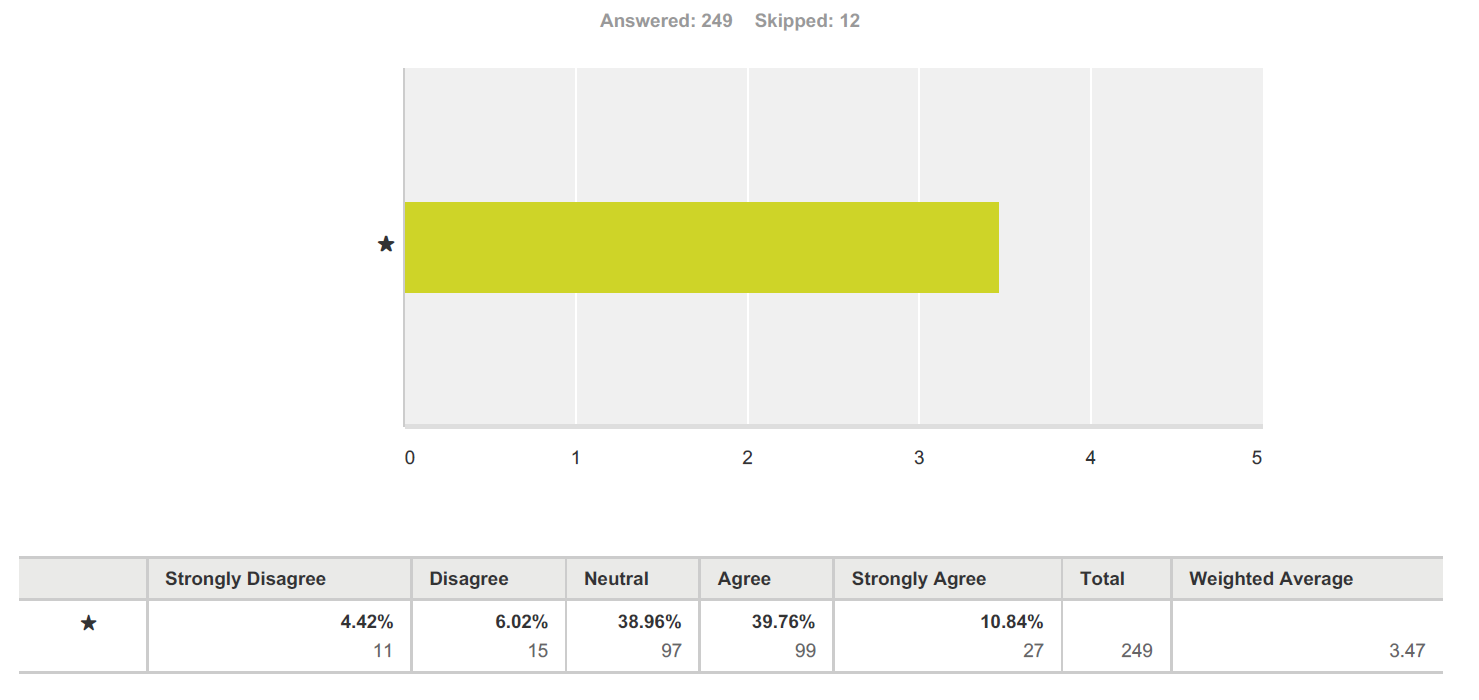
“Our Thoughts on Climate Change” surveys, 9th question: “climate change is affecting my country’s economy” displays the anticipated results from the youth. Over 50% surveyed “agree” that climate change is affecting Australia’s economy. Though over 10% “disagree” with the impact of climate change on Australia’s economy, the evidence and expert estimates showcases the great deal of consequences Australia’s economy will have due to climate change.
Australia’s economy is indeed deeply affected by climate change. Economic sectors involving tourism, water security, health, agriculture, coastal communities and infrastructure are the main sectors of the economy affected or will be affected by climate change in Australia.
Rising sea levels pose a much of a threat to Australia highly developed and populated coastal communities. For example, in the state of Queensland, between 48,300 and 67,700 residential buildings, with a current value of between $15.4 billion and $20 billion may be at risk of inundation from a sea level rise of 1.1 metres. This, combined with the damage of the other states would cause a major impact on the Australian economy.
Water is another sector affected through climate change in Australia. In Western Australia, rainfall in the south-west region has already reduced by around 15% since the mid-1970s. There is evidence suggesting that the greenhouse gases emitted by human activities are the mainly responsible for half of the decline in rainfall in south-west Australia. Climate change modelling showcases a decrease in the mean annual rainfall of 7% and 14%, therefore displaying reduction in surface water runoff in the period 2021 to 2050, relative to the period 1961 to 1990. It is an accepted fact that hotter and drier climate would inflict a high economic impact on water supply infrastructure across the country with Perth (WA) to be the most severely impacted city in Australia due to induced water scarcity.
The Great Barrier Reef Marine Park which has contributed $5.4 billion to Australian economy (2006-07) and provided employment for approximately 53 800 people in Australia is greatly threatened by climate change. Sea surface temperatures across the Great Barrier Reef have increased by 0.4 degrees in the past 30 years and increasing atmospheric carbon dioxide has also resulted in an increase in ocean acidity. These trends are expected to continue with climate change. As a result of this prolonged increase in sea surface temperatures, the Great Barrier Reef has recently experienced a number of coral bleaching events. The most severe mass bleaching events spanned the summer seasons of 1997-98 and 2001-02, with over 50 per cent of reefs affected by bleaching, resulting in lasting damage to an estimated 5 per cent of reefs. Bleaching events are likely to diminish the ability of corals to recover and adapt, thereby seriously threatening the Great Barrier Reef ecosystems.
Agriculture plays an important role in the Australian economy. Take the state of Victoria as an example. Potential climate change has the ability to reduce productivity in agricultural sector throughout Australia including Victoria. Scientists suggest that while wheat producers may benefit from carbon dioxide fertilisation with modest levels of warming however yields are likely to decline under more extreme warming scenarios. For example, in the region of Birchip (WA), yields may drop by more than 20% by 2100 in the absence of mitigation.
Therefore, the decisions made today regarding our infrastructure, health, water management, agriculture, biodiversity and housing will have lasting consequences on the future of Australia, as well as the world.
Question 10: I feel like the government listens to the youth’s point of view and concerns on the climate change By Saige Quadrio, Tharushi Seenikkue and Jade Stanek
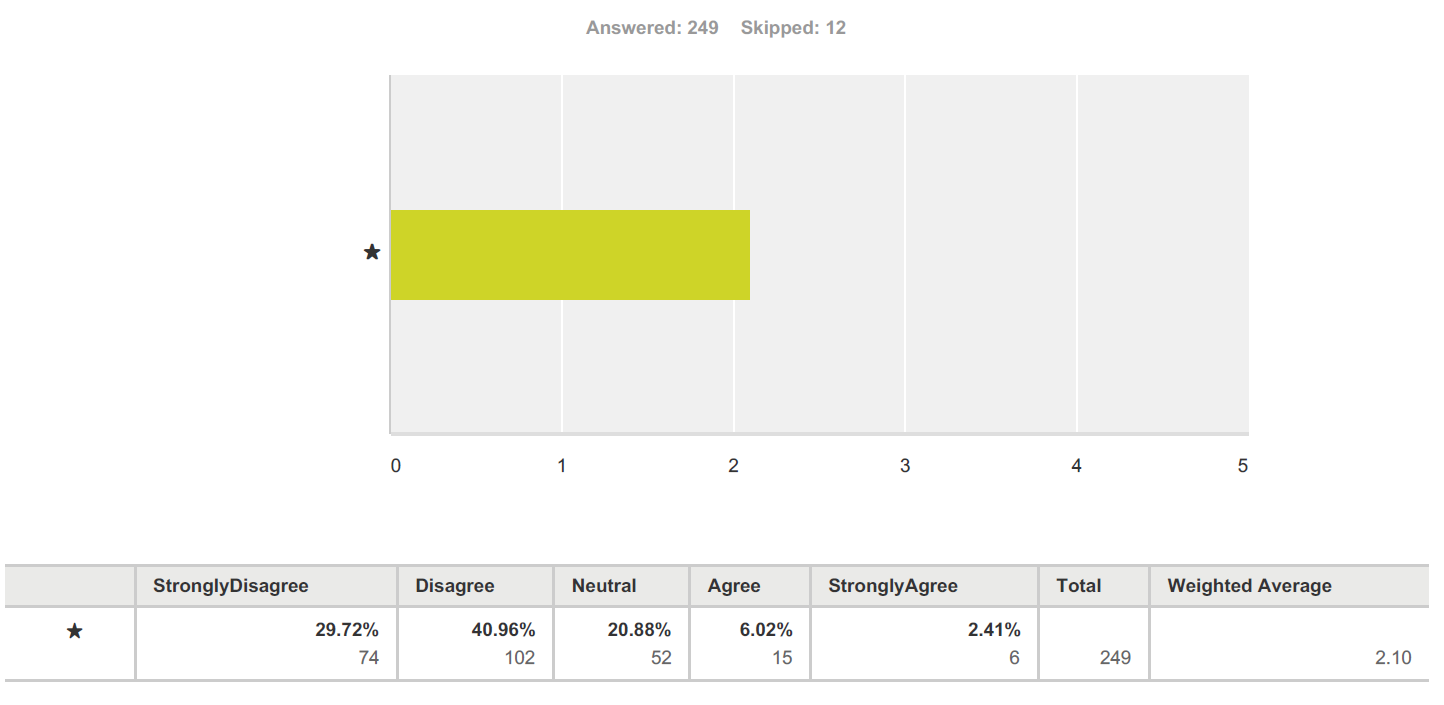
“I feel like that the government listens to the youth’s point of view and concerns on climate change” exhibits the predicted results from the Australian youth. Almost 71% surveyed “disagree” on the statement that the Australian government listens to the youth’s point of view and concerns on climate change. If the Australian government is not listening then there is no youth opinion on climate change.
As the data of the survey represents, majority of the youth believes that the government does not listen to their point of view and concerns on climate change. Australia however is one of the few countries to have established publicly recognised youth coalitions and organisations on climate change.
One of the key organisations involved in bringing the youth’s point of view on climate change is the Australia’s Youth Climate Coalition. Australia’s Youth Climate Coalition established in 2006, shares the aim of “educating, inspiring, empowering and mobilising an entire generation in the struggle for climate justice and a clean energy future”. In the lead up to COP21, the AYCC campaigned on behalf of young Australians aiming for the government to reduce Australia’s pollution by at least 40% by 2020, invest in transitioning to 100% renewable energy within 10 years and move Australia beyond coal and gas.
Another organisation working on climate change demographics in Australia called, “Climate Institute Organisation Australia” explains that younger people in Australia want to see their nation lead in this issue of climate change as 66% of youth expressing this compared to the 57% of 35 to 54 year olds and 51% of the older population. Demographics show that the youth are also more optimistic about Australia’s ability to influence other countries to tackle climate change.
A survey conducted by AYCC and Oaktree named “Plan International” presents that ninety per cent of the youth participants thinks that the Australian Government is not doing enough to tackle climate change. As Alex in Year 11 recognised, “Individuals can do little things [but] governments can enact big policy changes that have a bigger impact.”
Individuals also have a role to play in stopping climate change. Sarmad, 24, said, “Everyone is responsible. No one is exempt”.
Many consultation participants also expressed a strong view the Australian government should be doing more, because Australia has the capacity, the resources and the wealth to do more of the heavy lifting to stop climate change.
“We are the sunniest and windiest country on Earth, but we’re not taking advantage of this.” George, Year 11.
All in all, it is very clear that the Australian youth does not think that the government listens to their opinion on climate change or that the government is taking enough and necessary action to help reduce our impact on the planet Earth and prevent the potentially disastrous outcomes of climate change.
Question 11: I am often asked to think/talk/learn about climate change in school. By Saige Quadrio, Tharushi Seenikkue and Jade Stanek
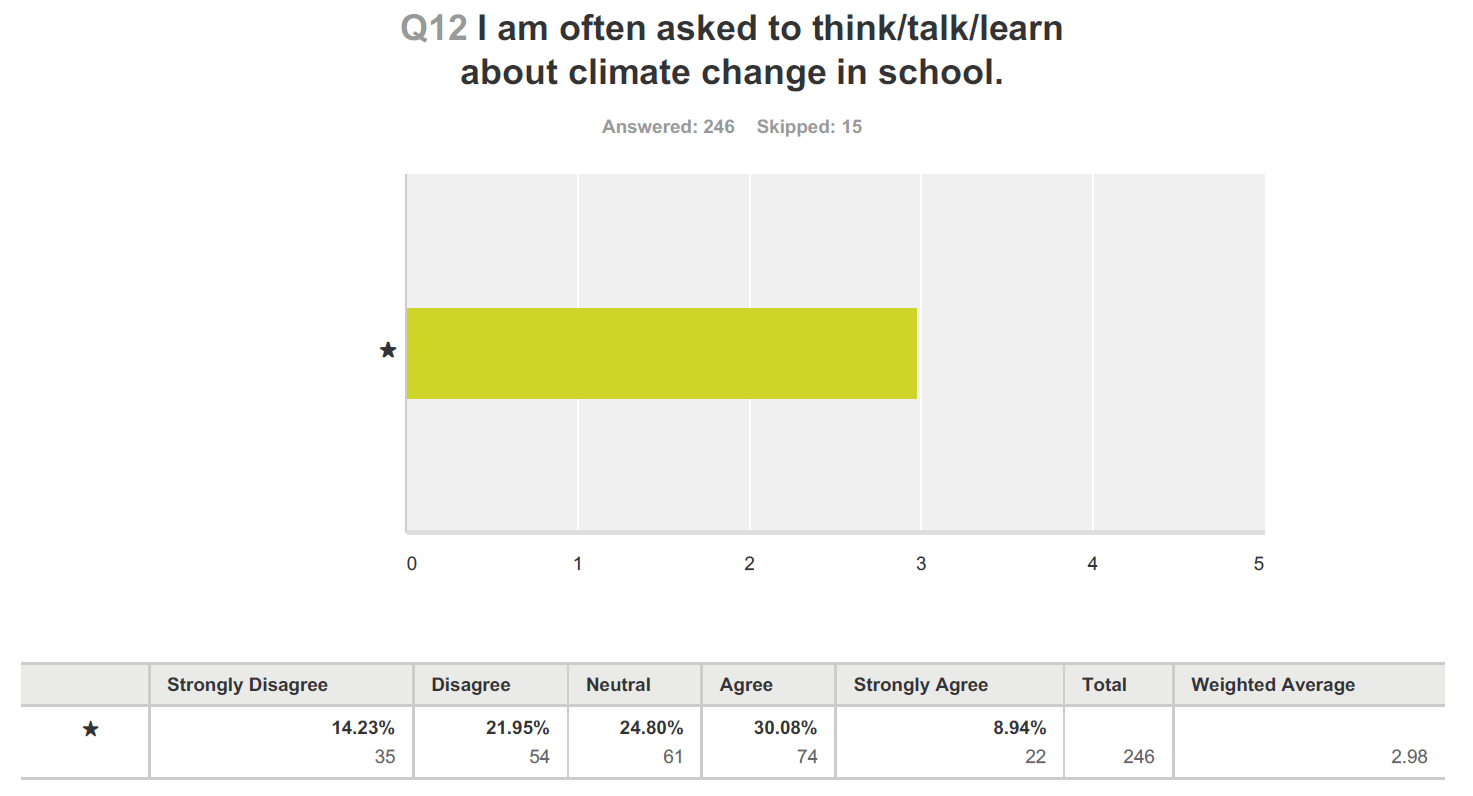
The data collected from the survey shows that while 39.02% of students who participated said that they either agree or strongly agree to being asked to think/talk/learn about climate change in school. The other 60.98% are either neutral or say that they don’t. The Australian Curriculum only includes climate change up until Year 8 and so anyone in grades above this may have forgotten what they learnt in previous years and not being asked to think about an issue that is increasingly affecting the present and future of this planet.
Despite climate change being included in the Australian Curriculum for schools, the large majority who don’t agree to learning about climate change implies that as a whole, the topic isn’t being addressed in the right way and the lessons that are being taught are unclear and tentative. These results also show that this topic is being brushed over rather than being explored in further detail, and so students aren’t retaining the information that they learn.
Question 12: I talk to my parents/community elders about climate change. By Saige Quadrio, Tharushi Seenikkue and Jade Stanek
Only 25.2% of youth who completed the survey said that they either agree or strongly agree to talking to their parents and community elders about climate change. This means that the other 74.8% of youth do not. These collected statistics are supported by the results for those learning about climate change in school as majority of youth don’t agree to learning about climate change and therefore won’t go home and talk about it as they are main be unaware of this issue.
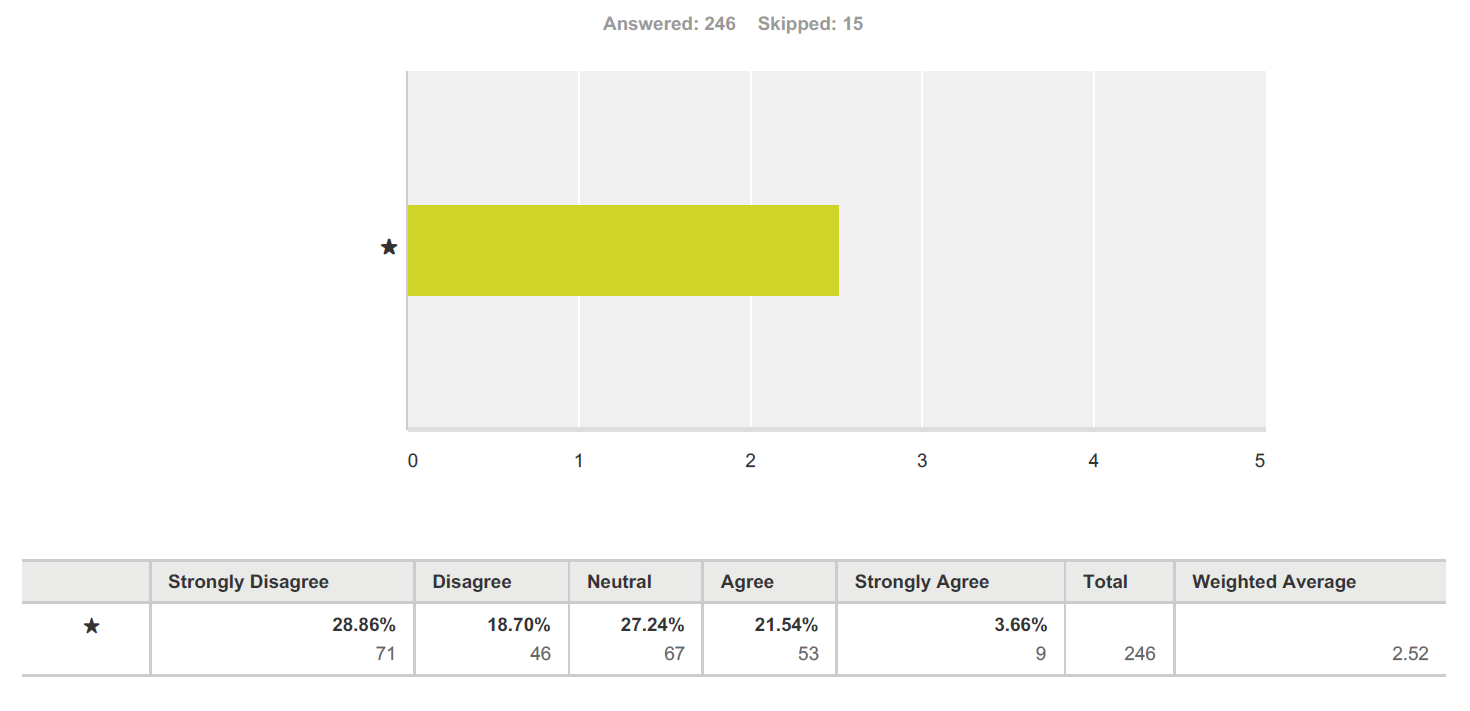
Question 13: I think climate change is the most important issue of my generation. By Saige Quadrio, Tharushi Seenikkue and Jade Stanek
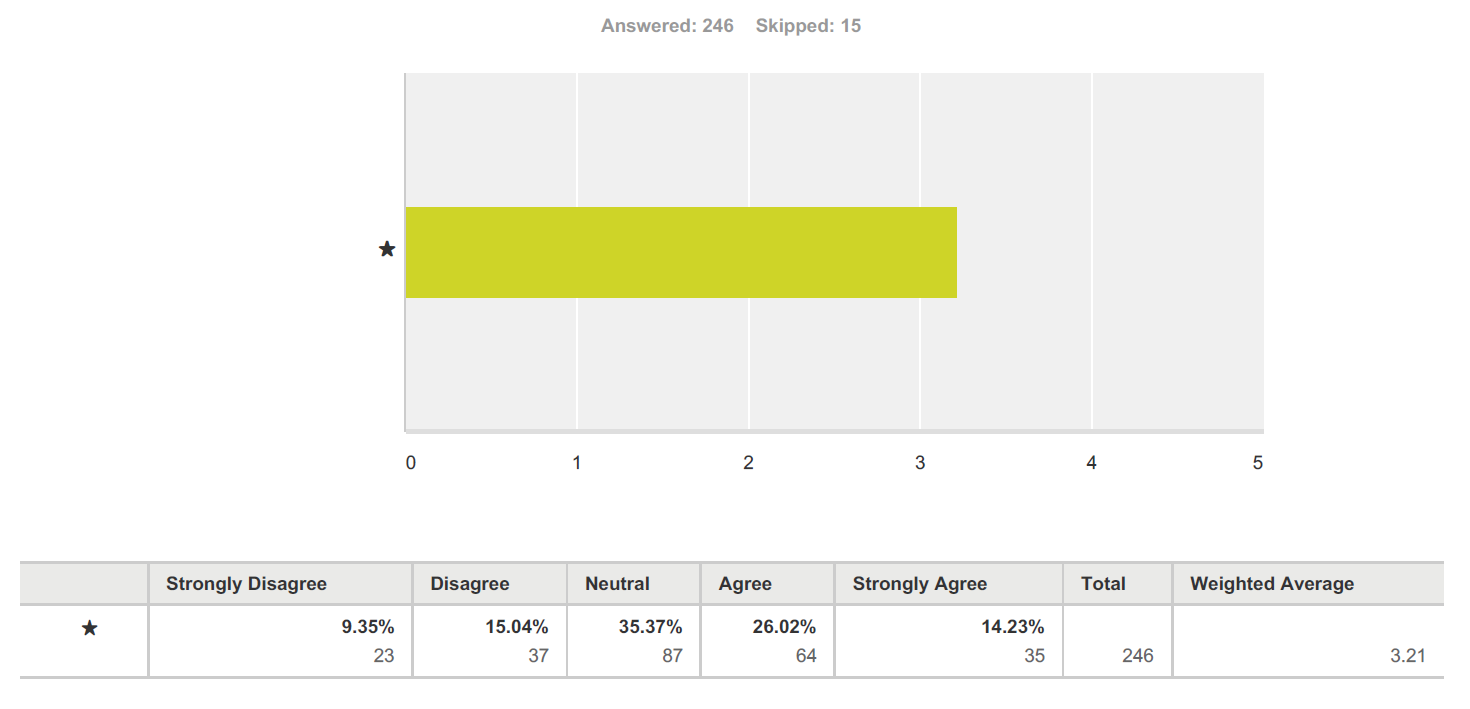
Once again, the issue for Australia is the waning interest and engagement with climate change and the decline in it's political importance. Despite this 40.25% of the youth see it as an important issue for their generation but it is disturbing to see such a significantly low number.
Question 14: Which of the following events pose the biggest threat to people and the environment in Australia and the Pacific? By Matthew Newell and Chase Pontifex
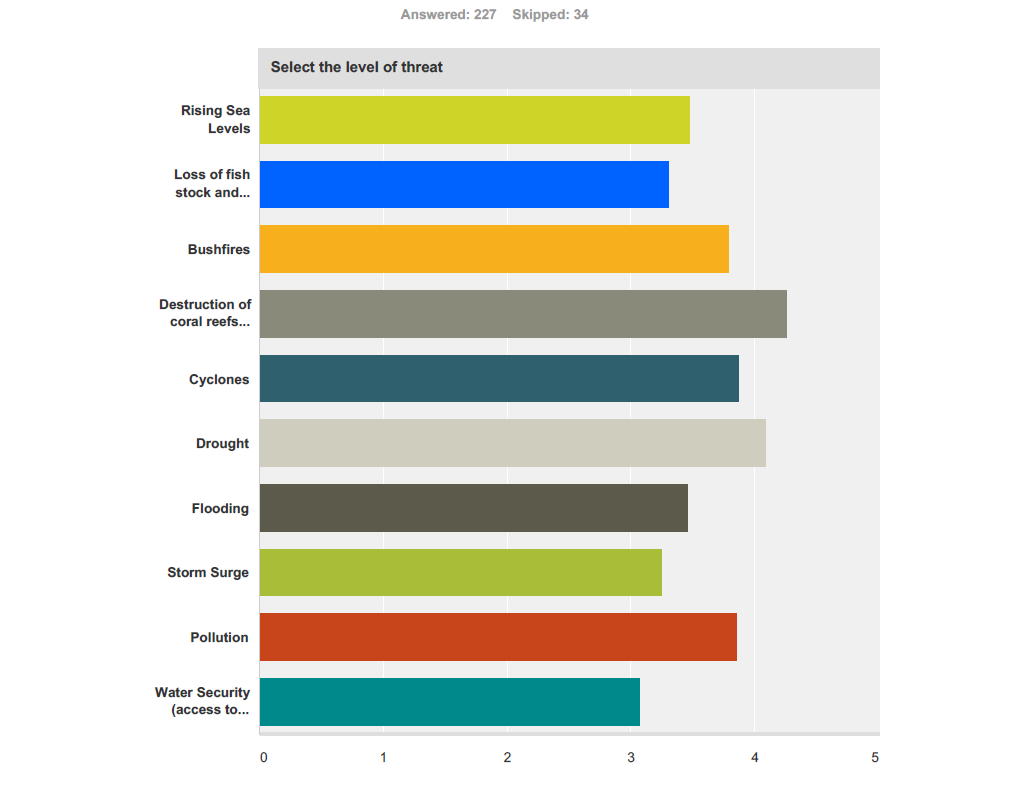
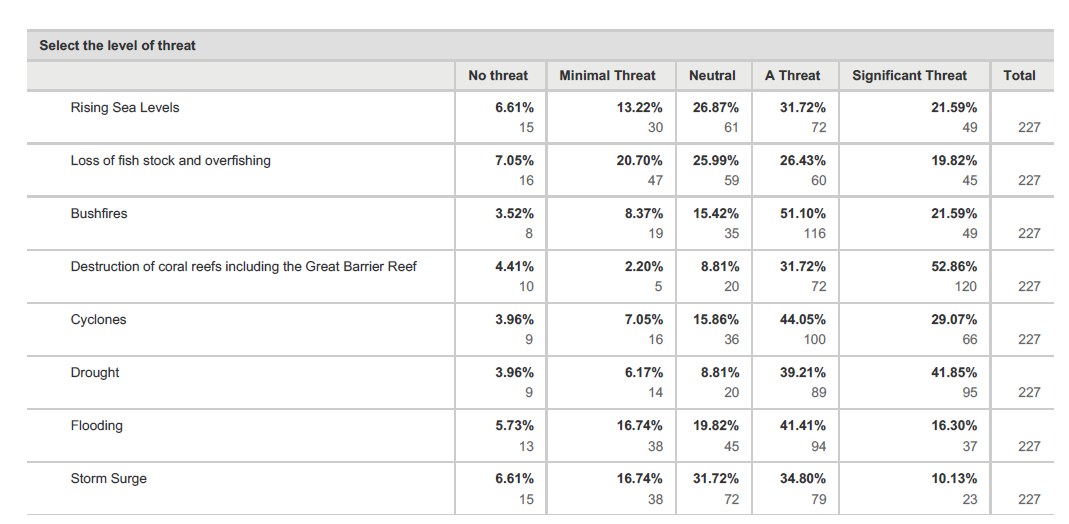
The following is an overview of some of the climate change issues affecting Australia and the Pacific region:
1. Rising Sea Levels
Main Causes:
- 1.Thermal Expansion: the expansion of oceans due to a rise in temperature – not more water but water takes up more space
- 2.Water Flows: mainly from ice but also from land run-off – more water in the ocean making it take up more volume
Severity in Australia and the Pacific:
|
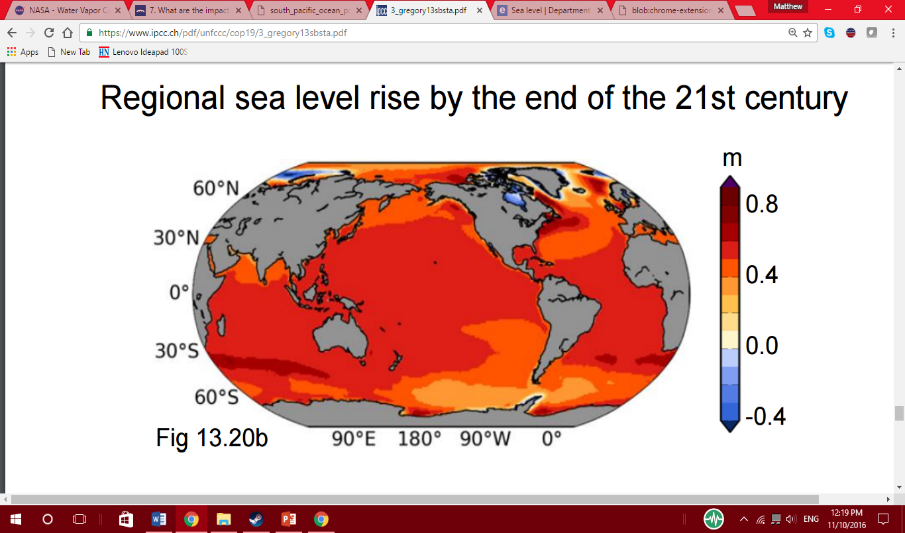
(http://www.slideshare.net/CFCC15/projections-of-sea-level-change)
Effects on Australia and the Pacific:
Around 53% of people identified rising sea levels as a “Threat” or a “Significant Threat”. This may seem like a large amount, but it also shows that around half the youth that that completed the question don’t believe rising sea levels are a threat. Considering the $200 billion dollars of infrastructure damage and the millions of people whose homes are at risk, this is troubling, especially considering only 21.59% of youth believe it is a significant risk. From the relatively high amount of “Neutral” selections, (26.87%), it can be inferred that many people aren’t sure about the risk posed by rising sea levels.
2. Loss of Fish
3. Bushfires
Main Causes:
Black Saturday Bushfire
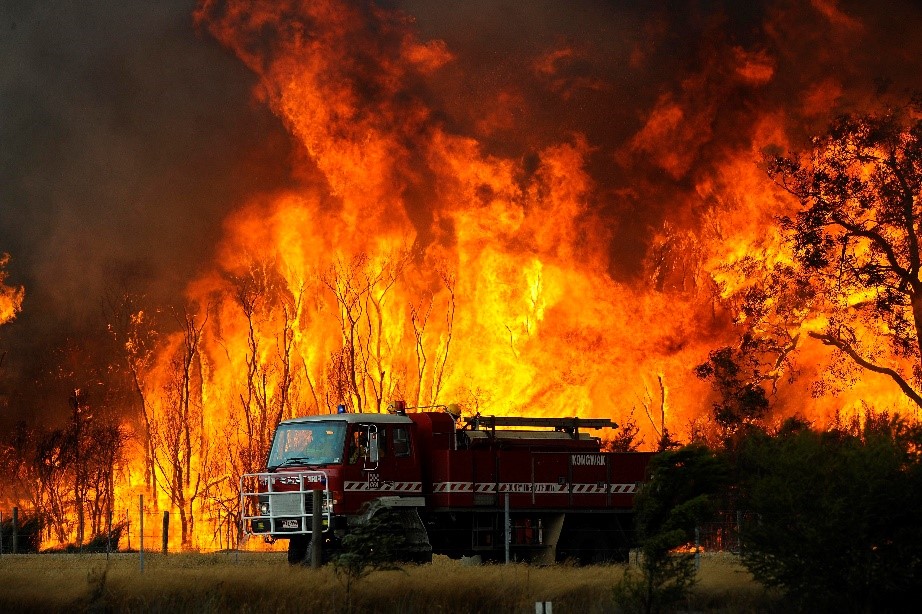
(http://www.sbs.com.au/news/article/2015/02/06/black-saturday-victims-agree-300m-settlement)
Survey Interpretation:
A total of 72.69% of people identified bushfires as a threat or a significant threat to Australia and the Pacific. This is a decent representation of the real threat it poses. People likely believe it is more of a problem than other issues due to its noticeable effects. It is much less insidious than the issues like sea level rises, which happen very slowly and are almost imperceptible.
4. Destruction of coral reefs including the Great Barrier Reef
The Great Barrier Reef:
The Great Barrier Reef is the largest reef in the world, and spans a total area of 344,400 km2. The Great Barrier Reef is located in Northern Queensland and is home to over 500 species and is currently undergoing mass coal bleaching. It is estimated that a total of 93% of the Great Barrier Reef is already displaying the effects of coral bleaching. Coral bleaching occurs when the essential zooxanthellae algae “evacuate” the coral. This is caused when the temperature of the ocean surrounding a reef differs from usual temperatures (approximately 24 degrees). The coral polyps feed off of zooxanthellae algae and when they “evacuate” the corals are more susceptible to dying, as they have lost their main source of food.
Healthy Reef
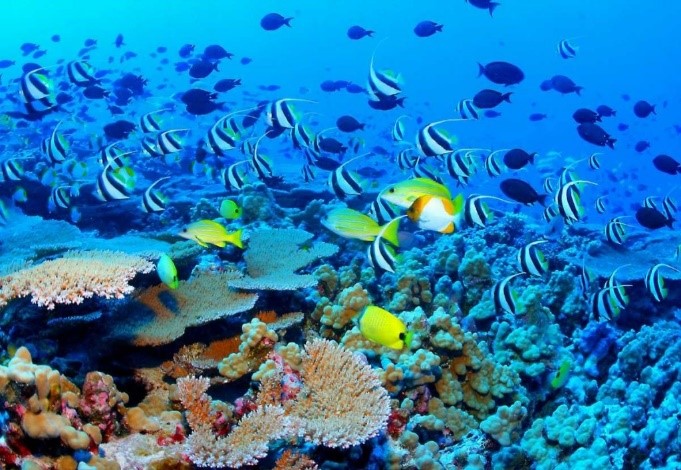
Reef Affected by Coral Bleaching
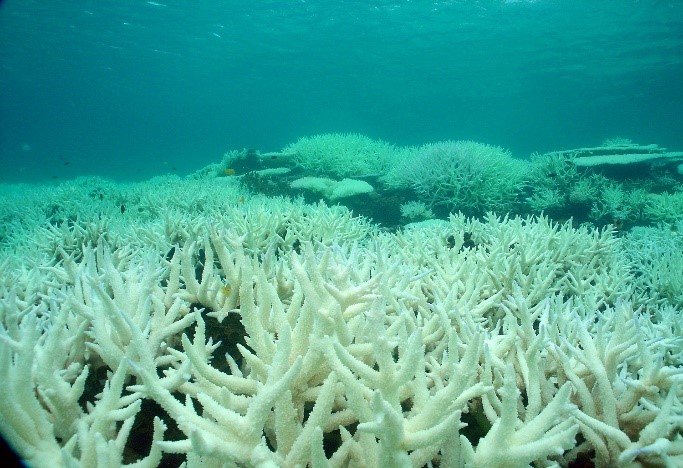
Problems facing the Great Barrier Reef:
1)El Niño:
Currently the world is coming out of the “El Niño” phase
Many of the issues Australia has been facing are outlined in the characteristics of El Niño. These include reduced rainfall, droughts and abnormally high land and sea temperatures.
The El Niño phase is one of the best supported reason for the bleaching of coral reefs, including Australia’s Great Barrier Reef.
2) Global Warming
Data shows that the increased release of greenhouse gases traps larger amounts of heat inside Earth’s atmosphere, which results in rising temperatures of the ocean. This is also known as the Greenhouse Effect.
Survey Interpretation:
The mass bleaching of the Great Barrier Reef is recognised as an increasing problem for Australia. This is supported by the collected survey data which shows that 84.58% of young people (between the ages 10-21) believe that “The Destruction of the Great Barrier Reef” imposes a threat or significant threat to Australia and the Pacific Islands. This is the largest threat identified out of all of those presented in the survey, which is interesting as it is arguably the least life-threatening to humans.
5. Cyclones
Cyclones are the Southern Hemisphere version of hurricanes. They have very similar characteristics but spin clockwise rather than counter-clockwise due to the Coriolis Effect.
Cyclone Structure
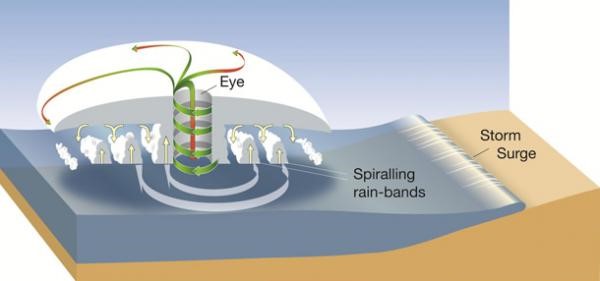
(http://media.bom.gov.au/social/blog/46/a-look-inside-the-structure-of-a-tropical-cyclone/)
Causes:
73.12% of young Australian's think that cyclones are a threat, whereas 11.01% believe there is minimal or no threat. Cyclones in the southern hemisphere pose a threat to the reef.
The damage that cyclones pose to the reef include damage to individual coral and to the structure of the reef. This severe and widespread damage can take decades to repair depending on the weather. The fact that 73.12% of the people who took the survey agree that cyclones are a threat means they are viewed as problematic, probably because the effect of cyclones are shown to be more devastating than other natural disasters such as drought or rising sea levels.
6. Drought
Major Causes:
- A hydrological drought occurs when water reserves available fall below the statistical average
- Overuse/ misuse of water in cities
- El Niño phase
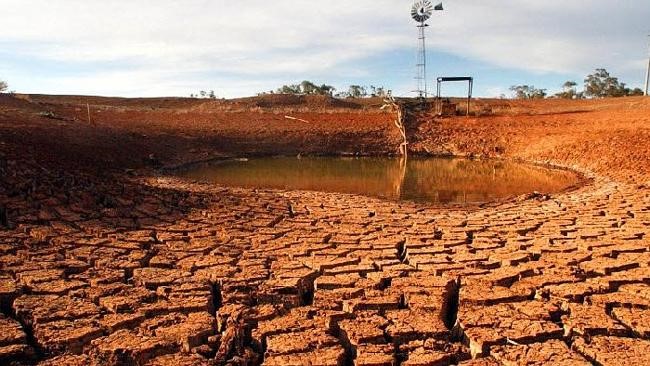
Survey Analysis:
81.06% of Australian youth believe that drought is a threat or a significant threat. This is true because there is constantly a drought somewhere in Australia, but also floods at the same time in other places. The inconsistency of the weather may be caused by global warming. This is only going to continue and worsen the effect and duration of droughts around the world. Drought has the biggest effect on Australian farmers as it stops their crops from growing and therefore stops their source of income. Drought has the same effect on cattle farms, decreasing the amount of water that can be used to nourish the animals and results in less income for those farmers. Considering a large majority of Australian Youth believe drought is a problem, it means it will be easier to push a water campaign to stop the misuse and abuse of the cheap water in our country.
7. Floods
8. Storm Surge
9. Pollution
Australia’s Contribution:
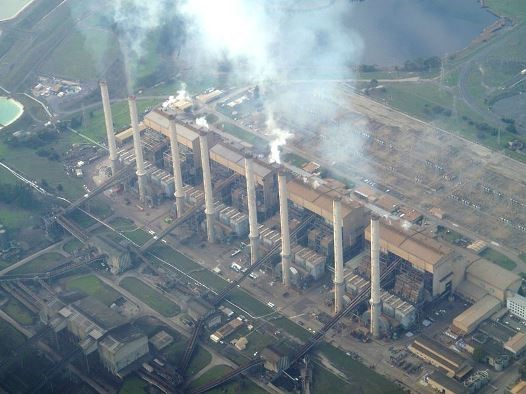
Air Pollution
(https://envirojustice.org.au/blog/air-pollution-control-the-case-for-a-new-national-approach)
Survey Analysis:
In previous times pollution was considered a minor issue and not in the public or media interest. However, over the last 30 years it was recognised as a significant problem for Australia and the Government and business have invested heavily to reduce the impact of pollution.
As a results of the focus on pollution, and the associated impact on the environment, the survey is severely weighted towards people believing this as a significant threat, with over 70% of people believing this is a threat and less than 10% believing it is of no concern. We clearly are having an impact on the environment and the fact that the youth recognises this is significant. This is after all one of the biggest issues facing Australia as it is a cause for branches into other issues, such as rising sea levels, destruction of coral reefs and water security.
10. Water Security
Severity in Australia and the Pacific:
- Australians have access to a clean and regular supply of water. Water security is only considered a problem during drought such as in Townsville. It is an issue for many Pacific island nations.
- Our community, Townsville, is currently in level three water restrictions, which limits water usage
- Australia, on the other hand, is not very concerned about water security because the development level is very high (second in the world)
- In the Pacific, there are also water security problems as many people don’t have adequate access to water
Australian Clean Drinking Water

(https://envirojustice.org.au/blog/air-pollution-control-the-case-for-a-new-national-approach)
Survey Analysis:
In terms of the survey, people seemed to disagree that water security was a big issue in the Asia and the Pacific. Only just over 40% of people identified it as a threat, ranking it the least threatening problem facing the region out of the 10 that were given as options. This is an indicator that the majority of the people who answered the survey are not aware of the problem that water security presents to less developed communities in the Pacific.
Question 14: Is responding to climate change an important issue for you? Why or why not?
The following are some of the responses of the youth who completed the survey.
- It is a very important issue to me because I want a clean and healthy world for myself and my future generations to live in.
- Climate change is defiantly a serious issue that will affect everyone in this generation and the next and needs to be look at for the health of everyone in our society and the environment around us.
- Yes, I'd like our generation to make a change!
- Climate Change is extremely important to me because I am a part of the generation who will deal with the consequences. We all need to work together to find a solution to Climate Change!
- Yes, it is an extremely important issue because of the drastic effects it will have, not only on the environment, but also the lifestyle and existence of the human race, if something is not done to stop it.
- No, because I'm 14 and I don't need this dilemma impacting my life
- Responding to climate change is an important issue, because global warming had dramatically increased over the past years. This has resulted in heat trapping inside the atmosphere causing the build-up of excessive greenhouse gases such as CO2. It also increased the formation of other gases that form a barrier around the atmosphere, reflecting the UV rays back to Earth increasing the temperature.
- It's an important issue because climate change could severely impact the world and its resources for all future generations and impact on their quality of living.
- Yes because there is evidence that it is occurring and it is important that something is done now to reduce the impact it may have on future generations.
- Yes it is. Because this is our world and it's constantly changing, while we can't do much about the change, we can more or less control the change and the rate of change. A couple of weeks ago, I was at a Reef Guardians Conference and we were discussing how bad the corals were affected during summer, and it's made me realise that we must do something about it immediately if we want to sustain the reef. Also, the polar ice caps melting and the water level rising is also a significant issue. Many people in the Pacific Islands are affected and their homes are drowning. We must try to reduce pollution, especially carbon pollution to help those people and everyone around the world
- I believe something needs to be done, and that every single action taking is helping our environment which we should cherish instead of destroy
- Responding to climate change is one of the most important issues for me because it directly effects millions of innocent people. Fuelled by greed the most powerful people on earth have completely ignored the effect of their quest for money, the Australian government had even supported the mining of coal and the expansion of ports and coal mines which would have a huge impact on the Great Barrier Reef, and surrounding areas such as the Pacific islands. Australians have one of the world’s highest Carbon footprint per capita which directly causes sea level rises and will cause the Pacific islands to disappear, although the people living in the pacific islands have had little to do with the cause of the sea level rises.
- Yes, because the current politicians a world leaders are ignoring the use as they won't still be alive when its affects come into play. Instead it is the current youth that are faced with this threat and hence, it becomes our responsibility to solve this growing problem of climate change.
- Yes, it's our world, we all have to survive.
- Yes. Even though it is still unsure whether this is just another earth cycle (ice age) I still think the consequences could be pretty bad and so taking measures to lessen the damage is critical.
- Climate change is a natural process that the Earth's systems undergo. However, this change has been accelerated via human intervention, causing quite significant issues for the Earth, so yes Climate change is an important issue for me and more people should understand and care about the effect we are having on our environment.
- Yes, as it is important to preserve what we have left to ensure that future generations get to experience the life and environments that we enjoy today.
- I worry for the great barrier reef 10/7/2016 6:58 PM
- Seasonal shifts, extreme weather conditions, change in precipitation patterns caused by climate change will impact farming and agriculture, a source of food and livelihood for more than half of the global population.
- It is significant as it is a catalyst for natural disasters of which have proven to be lethal within Australia.
- Not educated enough on the issue to give a cohesive answer; that's why educating about climate change could benefit the issue
- Responding to climate change is an issue for everyone, even if you do not directly notice it does not mean it isn't something you should ignore. So yes, I do believe in responding to the issue.
- No, climate change hasn't impacted me personally and I believe there are more important issues in the world than climate change.
- It determines the future of Australia and furthermore the World.
- Climate change is a very important issue because it effects everyone. It is very good to see that in response to this topic school kids are being targeted. The school should approach more students in giving them the opportunity to participate.
- Responding to climate change is a huge issue for me personally. Climate change should be taken seriously to prevent or even stop the change completely as the world is slowly degrading as a result of human impacts towards the planet.
- We are already suffering from drought, pollution and other threats around the world because of climate change. By responding to the effects and making a difference we can decrease the effects of climate change.
- Yes it is an important issue because I would like the world to be safe for my children in the future and it would also be cool to see what happens when we use renewable energy and the wide variety of natural resources we have to its full potential.
- This is an important issue to respond to as it concerns not only Australia, but the whole world. By changing the climate, it can really upset the delicate balance in ecosystems and cause a chain reaction in terms of one system falling after another. The use of fossil fuels is increasing the damage and increasing the rate that climate change is affecting the world. It should be discussed as soon as possible to find a solution and stop the destruction of our world.
- Responding to climate change is an important issue for me because the fact the climate is rapidly changing and causing damage to the earth as a result of human actions, is distressing. What is even more concerning, is the fact that the majority of people, particularly those in power, are completely ignoring the issue and not raising awareness to the public.
- Everyone around me is talking about climate change/global warming, I kind of felt like I've been forced to form an opinion.
- Sea levels have been continuing to rise, and as sea levels rise, there will be more climate refugees, lives will be destroyed as people lose their place to live.
- Of course responding to climate change is an important issue for me. Why? Because world leaders say it's on their to do list but let’s face it, by the time it becomes a huge issue, they will be dead. But who will have to clean up the mess? The kids they left stranded, trying to figure out to breathe! Yes we deserve a voice, a genuine voice, that's not going to be looked down on because we are young. Right now, it feels as though we are the only ones where most of us care about our planet that you hurt. Listen to the innocent!
- We should all be supporting solar energy in Australia and especially North Queensland due to the amount of sunlight we have available. Renewable energy is the future for the next generation’s power supply and agriculture. By responding to climate change now we are more likely to save by using other power sources such as nuclear power.
- Not really because it is the governments job to look after the climate change. Youth don't get much say into what Australia does about climate change.
- Climate change is real, it is happening right now. It is the most urgent threat facing our entire species, and we need to work collectively together and stop procrastinating. We need to support leaders around the world who do not speak for the big polluters, but who speak for all of humanity, for the indigenous people of the world, for the billions and billions of underprivileged people out there who would be most affected by this. For our children’s children, and for those people out there whose voices have been drowned out by the politics of greed.
- It just seems irrational to just ignore the obvious issue and not respond while the world is literally dying.
- The thought of losing all the beauties this Earth gives us saddens me, even more when I realise we are the cause of the destruction.
- As someone who wishes to study ecology and contribute towards environmental efficiency, climate change is a very important issue. I think the youth of Australia should be interested in working towards an environmentally aware and productive future as we cannot ignore these issues any longer.
- We're immensely privileged to live in country such as Australia. We obviously have to fulfil our duties as future leaders of this country and we have an undeniable responsibility as caretakers to preserve our earth and prolong its well-being.
- The planet is our future but the decisions are being made by the people who have significantly contributed to the damage.
